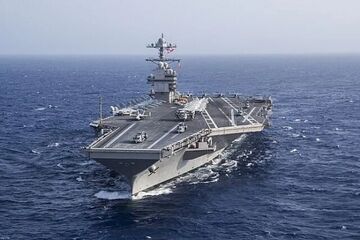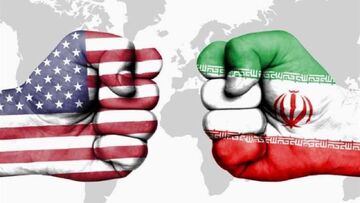TEHRAN(Bazaar) –Richard Anderson Falk, United Nations Special Rapporteur on "the situation of human rights in the Palestinian territories occupied since 1967, says the agreement between Iran and China, carefully negotiated, promises significant mutual benefit to both countries.
Following is the text of the interview of Bazaar with professor Richard Anderson Falk:
Bazaar: 25-year cooperation document between Iran and China was signed. What is the significance of this document for the two countries?
Richard Falk: The agreement, carefully negotiated, promises significant mutual benefit to both countries. For China it offers both an extension of its Belt and Road Initiative, involving major infrastructure and investment features. It also extends China’s diplomatic presence to an important country in the Middle East at an opportune time given the present global setting. The fact that the agreement covers a period of 25 years suggests that it represents a long-term commitment by China to Iran, presupposing continuity of political structures in both countries.
For Iran, it signals the United States that Beijing is not isolated, and possess policy alternatives that can encroach upon American strategic interests. It also sends the message that China will not submit to U.S. pressures with respect either to the restoration of JCPOA or curtail its regional diplomacy that runs counter to the positions of Israel, Saudi Arabia, and the U.S.. The economic dimensions relating to infrastructure investment and trade also promise relief from the burdens imposed on Iran and its people by U.S. sanctions and threat diplomacy. The long duration projected for the arrangements also gives Iranian governing arrangement a vote of confidence as to stability and legitimacy.
Bazaar: In terms of timing, what messages does the signing of this document have for the United States?
Richard Falk: The timing seems important. Coming at the outset of the Biden presidency it sends a dual message: that China is prepared to support countries that are placed under intense pressure by the United States and that China’s international policies will not be changed by the sort of bullying tactics that were exhibited by the American Secretary of State, Antony Blinken, at the recent bilateral meetings in Alaska. It also is an illustration of the difference between the U.S. emphasis on militarism, either through coercive diplomacy, arms sales, and overseas bases, and the Chinese stress on developing win/win economic relationships that result in mutual benefits without intervention in internal affairs or abridgement of sovereign rights. At times, Chinese diplomacy may weaken national self-reliance and autonomous development of its partners, but its diplomacy seems to rest consistently on peaceful means and mutual benefits.
Bazaar: The United States has expressed concern about the signing of this cooperation document. What worries America?
Richard Falk: The United States has two principal concerns: a weakening of its diplomatic leverage with Iran and a further display of Chinese competitive skills that expose the weakness of current U.S. hegemonic approaches to world order. The fact that this cooperative mega-agreement is situated in the Middle East also threatens to weaken U.S. regional influence in a crucial strategic setting where it has been unopposed since the end of the Cold War in the early 1990. This observation is given added plausibility by the recent efforts of several important countries in the Middle East, including even Israel and Saudi Arabia, to enter into significant economic relationships with China. The good will visit of the Chinese Foreign Minister, Wang Yi, to the region also highlighted the increasing China’s interest and activity in the region, which can only make Washington nervous about being displaced, or at least challenged. Mr. Wang set forth five principles of inter-governmental conduct, which if accepted by the governments of the region, would encourage China to play a supportive role. In this spirit the Foreign Minister ventured to suggest China’s willingness to host a conference dealing with the security of sea lanes and oil facilities in the Middle East.
Bazaar: During Iran foreign minister Zarif's visit to China, the Chinese Foreign Minister somehow tied the signing of this agreement to the settlement of Iran's disputes with the countries of the region. But he has now traveled to Iran to sign the agreement. Has there been a change in China's view since Biden came to power in the United States? In other words, has China been waiting for the policy of the new US administration?
Richard Falk: That earlier Chinese reluctance to sign the agreement has not been mentioned very often in the Western assessment of the event, but such a change of position on China’s part lends weight to the circumstantial evidence that formalizing the agreement at this time reflects a reaction to the wider political context. It particularly suggests that China is prepared to demonstrate its firmness and independence in relation to the United States. It is a warning to the Biden presidency that if the U.S. forcibly challenges China’s regional sphere of influence in the South China Seas, China has ways to retaliate. China may still be hoping for a de-escalation of tensions when the negative effects of starting a new cold war become better appreciated by the Biden leadership. This is speculative on my part as nothing formally articulated suggests that such a reconsideration is underway in Washington. The irresponsible allegations of ‘genocide’ being perpetrated by the Chinese government against the Uyghur minority in the Xinjiang area suggest a further worsening of relations, allegations certain to further inflame relations between these two major countries.
Nevertheless, Washington’s willingness to move toward the resumption of negotiations with regard to JCPOA may also be indicative of a new American interest in neutralizing China’s leverage and influence in Tehran. And beyond this, to keep open the possibility of limiting confrontations to peaceful forms of competition.
Bazaar: One of the important issues raised for this cooperation document is Iran's land connection to Iraq and Syria. In this way, China can connect to the Mediterranean Sea through Iran, Iraq and Syria. Iran has a strong presence in the Syrian port of Tartus, and pro-Iranian forces also control the Bokmal border crossing in Syria's Deir ez-Zor province and the al-Qaim crossing in Iraq's Anbar province. How feasible do you think this path is?
Richard Falk: I am not in a good position to make any informed judgment beyond expressing the view that this kind of projection is consistent with the Belt and Road Initiative, which has taken advantage of Chinese capital and skilled labor for similar development projects in Asia and Africa. All of these countries would benefit if such plans go forward, and it would strengthen the temptation to preserve political independence in Iraq and Syria to encourage such arrangements, which could be part of a broader strategy of protecting national security by practicing equi-distance diplomacy, that is, maintaining workable relations with both the U.S. and China without alignment with either one.















نظر شما